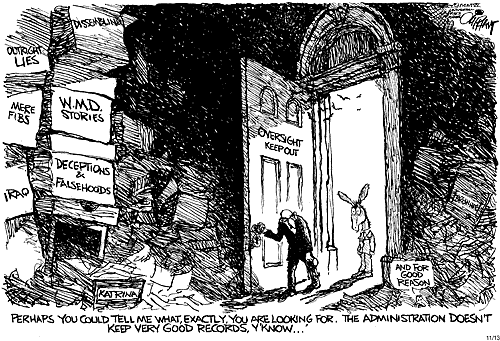Tuesday, November 14, 2006
Bloomberg: Bush's Power to Shape Judiciary `Over' Because of Election Loss

Bush's Power to Shape Judiciary `Over' Because of Election Loss
By James Rowley
Nov. 14 (Bloomberg) -- President George W. Bush's power to shape the federal judiciary is coming to an end.
The Democrats' takeover of the Senate in January means they will be able to deny consideration of nominees whose views they oppose on issues such as abortion. While Republicans will still control the lame-duck Senate session convening this week, there's little chance of action on many judgeships.
``The Bush presidency is over with regard to judges,'' said Manuel Miranda, a former Senate Republican aide who heads the Washington-based Third Branch Conference, which pushes for conservative judicial nominees. The best Republicans can hope for is that blocked judgeships will be an issue in the 2008 presidential election, Miranda said.
There are 16 appeals-court vacancies now and more will probably develop during Bush's remaining two years in office. In President Bill Clinton's last two years in office, a Republican- controlled Senate shelved 16 appeals-court nominees, preserving the vacancies for Bush to fill.
With a Republican-controlled Senate, Bush put Chief Justice John Roberts and Justice Samuel Alito on the Supreme Court and appointed 46 of the 179 judges on the nation's 13 federal appeals courts.
Democratic control of the Senate limits Bush's options filling any Supreme Court vacancy that might develop before he leaves office. A nominee such as Alito -- who drew the support of just four Democratic senators -- would probably fail to win confirmation.
Reservations About Roberts
While half the Senate's 44 Democrats voted for Roberts last year, many have expressed reservations since observing his performance on the high court, said Jeff Peck, a Washington lobbyist and former Democratic counsel to the Senate Judiciary Committee.
``The benefit of doubt is diminished'' for any future Supreme Court nominee, he said.
Bush is being urged by Senate Democrats to seek consensus on judicial nominees. ``Don't send us political extremists,'' Dick Durbin of Illinois, the Senate's No. 2 Democrat, said after the Nov. 7 election. ``I think that time has passed.''
Republican activists, meanwhile, say Bush should push for strongly ideological candidates even if they won't win confirmation.
Such a strategy might force newly elected Democratic senators such as Bob Casey Jr. of Pennsylvania, Claire McCaskill of Missouri, Jim Webb of Virginia and Jon Tester of Montana ``to be put to the test,'' said Sean Rushton, executive director of the Committee for Justice, a Washington advocacy group that has worked to support Bush judicial nominees.
Red State Democrats
Senate Democrats Ken Salazar of Colorado, Ben Nelson of Nebraska, Tim Johnson of South Dakota, Kent Conrad of North Dakota and David Pryor of Arkansas have sometimes shown a willingness to break ranks with their party over judges. These Democrats, like McCaskill, Webb and Tester, represent states that Bush carried in the 2004 presidential election.
One sign of how confrontational Bush wants to be is whether he will ask the lame-duck Senate to reconsider five nominations that were stalled before Congress left town in September.
They include Terrence Boyle, a federal district judge in North Carolina nominated to the appeals court in Richmond, Virginia, who is opposed by Democrats who say he has shown hostility to claims of racial discrimination and environmental abuse; William Haynes II, the Defense Department's general counsel, who Democrats -- along with South Carolina Republican Lindsey Graham -- say may have helped craft a policy for interrogating suspected terrorists that justified torture; and William Myers III, a mining industry lobbyist nominated to a San Francisco-based court who Democrats say is hostile to environmental regulation.
New York Senator Charles Schumer, who led the Democrats' campaign to win control of the Senate, said resubmitting the names would lead to more partisanship and political combat.
``We are asking the president, now that we are in the majority, to do what he hasn't done before, which is consult with us,'' Schumer said.
To contact the reporter on this story: James Rowley in Washington at jarowley@bloomberg.net .
Last Updated: November 14, 2006 00:11 EST